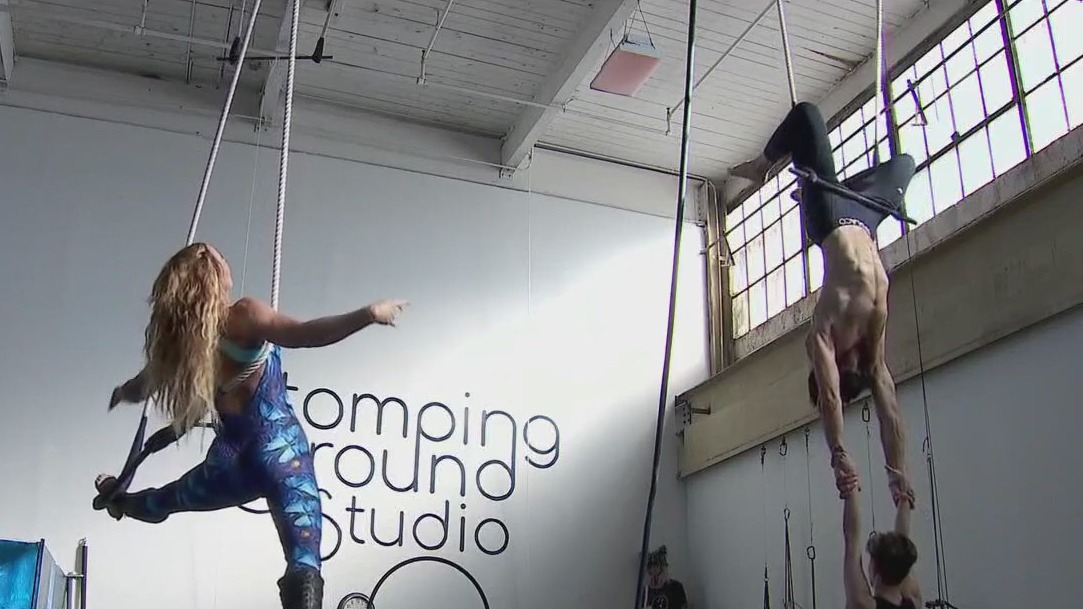Psychologist finds healing, helps others through circus therapy

MN psychologist helps others with circus therapy
Dr. Sherry Walling believes the benefits of play, courage, and teamwork are core elements of mental flourishing. FOX 9's Leah Beno shares more about how Dr. Walling is helping others through circus therapy.
(FOX 9) - Trapeze and other highly suspended equipment are the fixtures of Dr. Sherry Walling's approach with some of her patients.
"I’m a clinical psychologist, so I think a lot about how to help people recover from difficult things, experiences with depression, post-traumatic stress," Walling said. "Most of my work has been in the trauma and stress world and one of the things we keep coming back to in the larger mental health community is talk therapy is extraordinarily powerful and useful. Medication can be powerful and useful, but there are elements of our experience that get encoded in our bodies that we don’t often have ways to get after when we are just doing talk therapy."
Walling believes the benefits of play, courage and teamwork are core elements of mental flourishing. For some, using circus as therapy combines it all.
"I’ve long known our bodies hold our traumas and our griefs, but it wasn't until the loss of my father to cancer and my brother to suicide I really understood," Walling said.
Walling gave a Ted Talk on why a grieving psychologist joined the circus and wrote a book about how her newfound passion helps heal, even when pain left her speechless.
"I found my world really just taken apart. I just really didn’t know how to be or enjoy anymore. For some reason, aerial fabrics was the one place I felt I could be calm, like I was just focused on the movement, the climbing, on what my hands need to do, what my body was doing. It felt like the place I was slowly healing," says Walling "So it became a thing that I needed, and I longed for."
A shared bond of losing both their brothers to suicide inspired Walling and Lynn Lunny, co-owner of Stomping Ground Studio, to take their passion for healing through circus to new heights.
Last fall they put together a show with a narrative of how movement helps navigate grief, and within it, Lunny performed a three-minute handstand routine on a bench handmade by her late brother.
"Handstands became a meditative process for me," said Lunny. "It was quiet, it calmed my nervous system. These moments of deep focus I have to be present in."
Now, after the overflowing response, and participation from others healing through tricks and flips the way they are, another show is in the works for this spring. This next one has now been approved as a continuing education experience by the Minnesota Board of Psychology, Board of Behavioral Science, and Board of Social Work. After the show, a panel of professionals will talk about the role of movement in healing.
"I think many of us are working through our own mental health and carrying the emotional load of the community is a sacrificial intense job," said Walling. "I’m very hopeful that other mental health professionals will remember what it’s like to play in their own emotional expression."
Grant Robinson is among the next round of performers celebrating his love for the circus, and how it’s helped his 17 years of sobriety.
"It allowed me to focus on the positive athletic outlet with a lot of other positive people," said Robinson. "Circus is a really unique place where it allows people to individually shine. Someone else can be great, I can be great, and it’s not really a competition."
"Circus is my way, pottery is a way, dance, baking. There’s lots of ways that can help us get into that place of focus and calm. That’s really what we are after. It’s not like 'hey come do this circus' it’s ‘hey… find your own way to regulate your calm,’" said Walling.
The Touching Two Worlds circus show is coming up on May 4. For more information click here.

